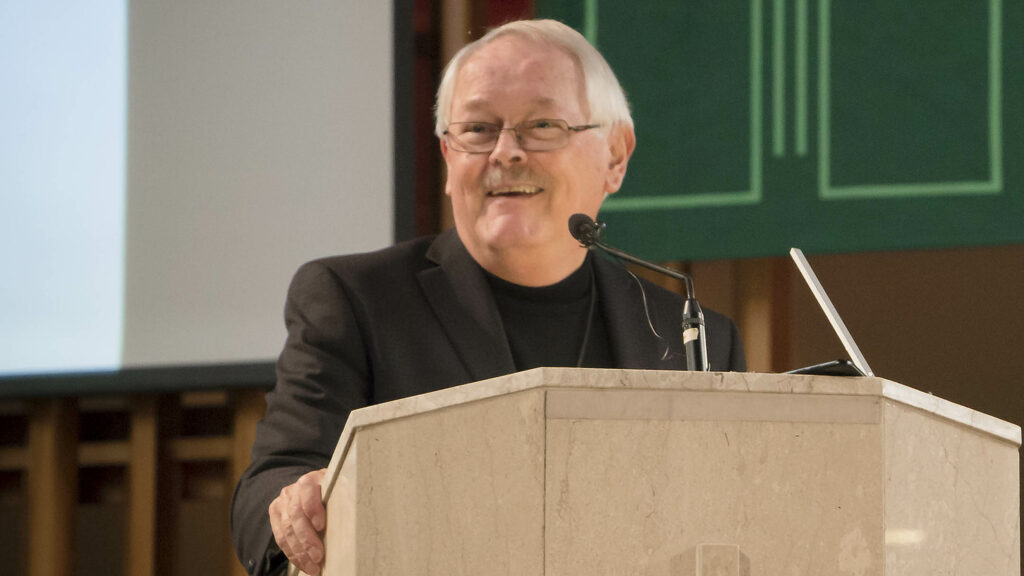We all struggle to not give in to coldness and hatred. This was even a struggle for Jesus. Like the rest of us, he had to struggle, mightily at times, to remain warm and loving.
It’s interesting to trace this out in the Gospel of Luke. This is the gospel of prayer. Luke shows Jesus praying more than all the other gospels combined. Moreover, in Luke’s gospel, Jesus’ disciples were intrigued by his prayer. They sensed something extraordinary about Jesus, not because he could walk on water and do miracles, but because, unlike the rest of us, he could in fact turn the cheek. He was strong enough not to give into coldness in the face of hatred, so strong that it threatened his very life. In every situation, no matter how bitter, he could be understanding and forgiving and never doubt that love and grace are what’s most real.
His disciples sensed that he drew this strength from a hidden source, some deep well of sustenance which he called his Father and which he accessed through prayer. For this reason, in Luke’s gospel, the disciples ask Jesus to teach them how to pray. They too want draw sustenance from this source.
But we see too in Luke’s gospel that this doesn’t always come without struggle. Sometimes things seem easy for Jesus; he meets love and understanding, and his ministry is joyous and easy. But when things begin to collapse, when the forces of hatred begin to encircle him, when majority of his followers abandon and betray him, and when his own death becomes imminent, then like the rest of us, fear and paranoia threaten to overwhelm him. This is in fact the essence of his struggle in the Garden of Gethsemane, his so-called agonia.
Simply put, it’s easy enough to be understanding, loving, and forgiving when you are bathed in them. It’s quite another thing when your very adherence to them is making you the object of misunderstanding, hatred, and murder. And so, in Gethsemane, we see Jesus prostrate, humanly devastated, on the ground, struggling mightily to cling to a cord of sustenance that had always sustained him in trust, love, and forgiveness and had kept paranoia, hatred, and despair at bay. And the answer doesn’t come easy for him. He has to pray repeatedly and, in Luke’s words, “sweat blood” before he can regain his balance and root himself again in that grace that sustained him throughout his ministry. Love and forgiveness are not easy. Not giving into to anger, bitterness, self-pity, hatred, and the desire for vengeance didn’t come easy for Jesus either.
And that’s our ultimate moral struggle: to not give into to our natural reaction whenever we are not respected, slighted, ignored, misunderstood, hated, or in small or large ways victimized. In the face of these, paranoia automatically takes over and most everything inside us conspires to create an obsessive pressure towards giving back in kind, slight for slight, disrespect for disrespect, ugliness for ugliness, hatred for hatred, violence for violence.
But there’s another possibility: Like Jesus, who himself had to struggle mightily to not give in to coldness and hatred, we too can draw strength through the same umbilical cord that nurtured him. His Father, God’s grace and strength, can nurture us too.
In his famous movie, The Passion of the Christ, Mel Gibson focuses on the physical suffering Jesus had to endure during his passion and death. Partly this has some merit since Jesus’ sufferings were in fact pretty horrific. But mostly it misses the point, as we see from the gospels. They make it a point to minimize any focus on the physical sufferings of Jesus. For the gospels, Jesus’ passion is not a physical drama but a moral one, indeed the ultimate moral drama. The real struggle for Jesus as he sweated blood in Gethsemane was not whether he would allow himself to die or invoke divine power and escape. The question was only about how he was going to die: In bitterness or love? In hatred or forgiveness?
That’s also our ultimate moral struggle, one which won’t just confront us at the moment of death but one which confronts us daily, hourly. In every situation in our lives, small or large, where we are unfairly ignored, slighted, insulted, hated, or victimized in any way, we face a choice of how to respond: Bitterness or understanding? Hatred or love? Vengeance or forgiveness?
And, like Jesus struggling in Gethsemane, we will have to struggle to continue to cling onto something beyond our natural instincts, beyond common sense, beyond our cultural dictates. Doing what comes naturally will not serve us well. Something beyond our DNA needs to be accessed.
The first word out of Jesus’ mouth in the Synoptic gospels is the word metanoia. Among its other meanings, it’s the opposite of paranoia. It means to trust even in the face of distrust. Paranoia is natural to us, metanoia isn’t; it requires struggling to draw sustenance from a deeper source.

